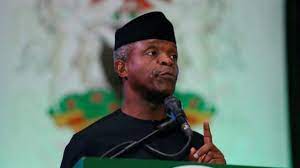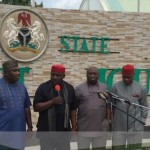FG Empowers Traders, Small Entrepreneurs With Loans Worth N38bn – Osinbajo
Latest Headlines, News Across Nigeria Wednesday, December 22nd, 2021
(AFRICAN EXAMINER) – Nigeria’s Vice President, Prof Yemi Osinbajo has said the Federal Government through its Social Investment Programmes (SIPs) has provided about 2.4 million loans to petty traders and small entrepreneurs worth N38 billion across the country.
Prof. Osinbajo disclosed this at the official launch of the “Review of Baseline Report and Realignment of the National Statistical System with Sustainable Development Goals (SDGs), 2020”, which was held at the Statehouse Banquet Hall, Abuja.
He said the loans which were disbursed through the Government Enterprise and Empowerment Programme (GEEP) and other related SIPs have been very impactful and beneficial, especially to young Nigerians.
He also noted that the current administration’s youth employment and skills enhancement initiative, N-Power Programme, is designed to employ 1 million youths between the ages of 18-35 and further equip them with skills for the job market over a two-year period.
The VP described the SIPs as a multi-pronged approach to wealth creation, human capacity development and poverty alleviation, stressing that the Conditional Cash Transfer (CCT) component of the programme reaches approximately 8.9 million poor and vulnerable households and 37.7 million individuals across the country.
“This is why in May 2019, Mr. President made a public commitment to lifting approximately 100 million Nigerians out of poverty within a 10-year period. This is a national development priority, which again follows on the establishment of our social protection programmes, the largest SIPs on the continent – and which by itself, is an attempt to accelerate the achievement of the SDGs across the country “, he said.
Prof. Osinbajo further explained that one of the objectives of the SIPs, which was to accelerate the attainment of the Sustainable Development Goals (SDGs) in the country. He added that the Federal Government’s national development objective is also in line with SDGs, and the Buhari administration will continue to ramp up efforts in reducing poverty, providing jobs for Nigerians, creating wealth and addressing climate change issues.
He also noted that with the launch, Nigeria will be able to further track its progress annually on the SDGs, adding that the implementation of the Federal Government’s social protection programmes was central to its vision for sustainable national development and achieving the SDGs.
According to him, Nigeria’s objective of achieving sustainable national development is consistent with the SDGs goals, “to engender an economically sustainable, socially inclusive and environmentally resilient world”.
“For Nigeria, and indeed Africa as a whole, the achievement of the SDGs is crucial to the task of ending poverty, hunger, and disease, and safeguarding our environment. Today’s ceremony marks the culmination of a process which began in 2016 for monitoring and evaluating the progress made in the implementation of the SDGs in Nigeria”, he added,
On the Report on the ‘Review of Baseline and Realignment of the National Statistical System with SDGs, 2020’ itself, he said “One of the areas of marked improvement in this document is the increased range of reporting – from the 126 indicators recorded in the 2016 Baseline Report – to the 141 indicators in the current 2020 Report.”
Prof Osinbajo noted that “as a successor plan for the Millennium Development Goals (MDGs), the Nigeria SDGs Indicator-Baseline Report (2016) reinforced the need to strengthen our national statistical system to enable effective tracking and monitoring of the SDGs that we all committed to”.
The VP observed that the Nigeria SDGs Implementation Plan (2020-2030) offers a coherent pathway for achieving the expected outcomes in the next decade. He equally noted that ensuring the SDGs by integrating them into plans and policies, was the approach taken by the Buhari administration in the implementation of its development plans.
“These include the Economic Recovery and Growth Plan (2017 – 2020), the National Poverty Reduction with Growth Strategy (NPGRS), the Economic Sustainability Plan (ESP), and more recently, the National Development Plan 2021-2025, which was approved by the Federal Executive Council in November”, he further explained.
He then presented the report and later inspected 19 ambulances presented by the Nigerian SDGs Office to support the healthcare delivery system at the sub-national level.
He commended the efforts of the Senior Special Assistant to the President on SDGs, Princess Adejoke Orelope-Adefulire, and the Statistician-General, Dr. Simon Harry who also made presentations at the event.
Prof Osinbajo praised Orelope-Adefulire for her “passion and commitment to the enormous task of meeting our SDG commitments”, and the Statistician-General “for your leadership in this important process”.
Related Posts
Short URL: https://www.africanexaminer.com/?p=72098






















